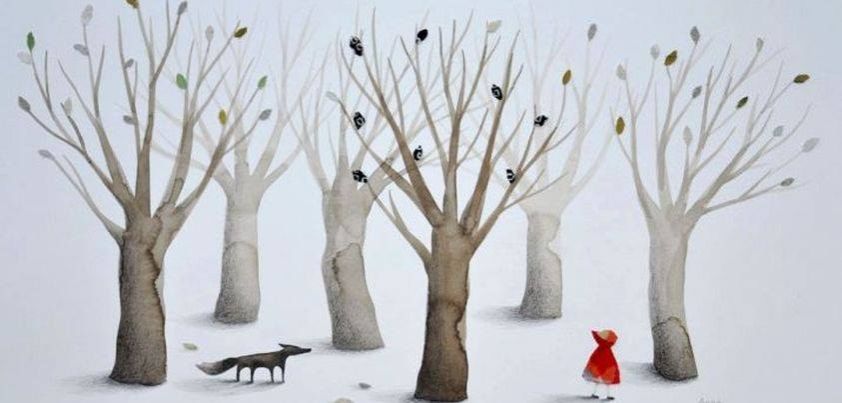 This time last year we featured Charles Perrault’s famous interpretation of an ancient folktale, Cinderella. Today we have another well-known Perrault story, Little Red Riding Hood. The version of the story most commonly told today is from a Brothers Grimm adaption known as Little Red Cap, published over 100 years after Perrault. In both versions, Red is punished for talking to strangers (the wolf) by being “eaten”. The Brothers extended the story to make it more appealing to children. In addition to Red and her grandmother miraculously surviving in the wolf’s stomach, they later meet and kill a second wolf. More…
This time last year we featured Charles Perrault’s famous interpretation of an ancient folktale, Cinderella. Today we have another well-known Perrault story, Little Red Riding Hood. The version of the story most commonly told today is from a Brothers Grimm adaption known as Little Red Cap, published over 100 years after Perrault. In both versions, Red is punished for talking to strangers (the wolf) by being “eaten”. The Brothers extended the story to make it more appealing to children. In addition to Red and her grandmother miraculously surviving in the wolf’s stomach, they later meet and kill a second wolf. More…
Category Archives: Folktales, Legends & Myths
The Voice of Death
 In this Romanian folktale, a rich man thinks how terrible it would be to die and have to leave all of his money behind. He sets out to find a land where people do not die. Finally, he comes across a country where the word death is unknown. Instead of dying, people simply follow a strange voice and never return. The rich man is sure that he is strong enough to resist the voice. He moves there with his wife and family, only to learn the truth of the English idiom: Nothing is certain in life but death and taxes. More…
In this Romanian folktale, a rich man thinks how terrible it would be to die and have to leave all of his money behind. He sets out to find a land where people do not die. Finally, he comes across a country where the word death is unknown. Instead of dying, people simply follow a strange voice and never return. The rich man is sure that he is strong enough to resist the voice. He moves there with his wife and family, only to learn the truth of the English idiom: Nothing is certain in life but death and taxes. More…
The Legend of Nai Raeng
 This folktale from Southern Thailand is about a man who was so big when he was born that his parents named him Nai Raeng (in Thai ‘raeng’ means strength, energy or power). The boy eats so much that his poor parents cannot feed him. They get him a job as a sailor, but the captain also cannot feed him. As Nai Raeng grows, he proves to be so wise that he gets a high government job. He is also very honourable, and one day must order that his own head be cut off and placed above a buried treasure. More…
This folktale from Southern Thailand is about a man who was so big when he was born that his parents named him Nai Raeng (in Thai ‘raeng’ means strength, energy or power). The boy eats so much that his poor parents cannot feed him. They get him a job as a sailor, but the captain also cannot feed him. As Nai Raeng grows, he proves to be so wise that he gets a high government job. He is also very honourable, and one day must order that his own head be cut off and placed above a buried treasure. More…
Lazy Jack
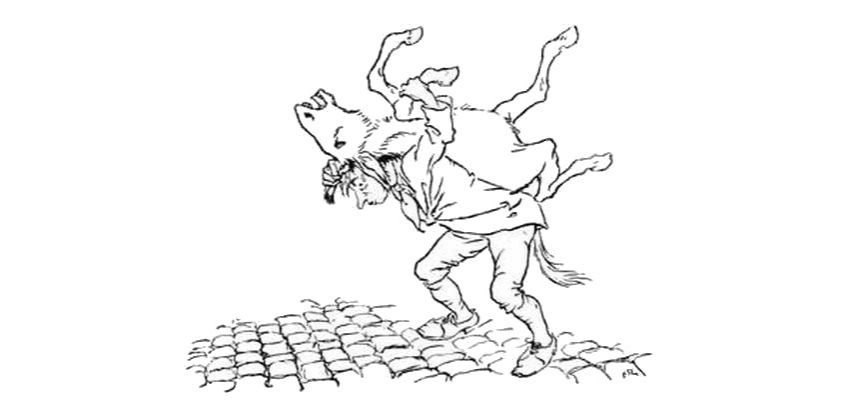 This English folktale is about a boy who isn’t very bright and doesn’t like the idea of work. However, thanks to following the advice of his mother, he marries a rich girl and, one imagines, never has to work again. Possible morals? For children: Always do what your parents tell you and you’ll have a good life. For parents: Teach your children the value of hard work so they can take care of you in your old age. For the rich girl: Sometimes laughter is the best medicine. For the rich girl’s father: Be careful of what you wish for! More…
This English folktale is about a boy who isn’t very bright and doesn’t like the idea of work. However, thanks to following the advice of his mother, he marries a rich girl and, one imagines, never has to work again. Possible morals? For children: Always do what your parents tell you and you’ll have a good life. For parents: Teach your children the value of hard work so they can take care of you in your old age. For the rich girl: Sometimes laughter is the best medicine. For the rich girl’s father: Be careful of what you wish for! More…
Cinderella
 Cinderella, perhaps the world’s best-known children’s story, has its origins in folklore. The version immortalized by Disney was first published in Charles Perrault’s 1697 book Stories or Tales from Times Past, with Morals, also known as Tales of Mother Goose. (Yes, Mother Goose was a man!) There are said to be over 1,000 variants of the story across the world. Perrault took the original framework, which has been around since the days of the pharaohs, and added the three elements for which his version is famous today: a fairy godmother, a pumpkin-carriage, and glass slippers. More…
Cinderella, perhaps the world’s best-known children’s story, has its origins in folklore. The version immortalized by Disney was first published in Charles Perrault’s 1697 book Stories or Tales from Times Past, with Morals, also known as Tales of Mother Goose. (Yes, Mother Goose was a man!) There are said to be over 1,000 variants of the story across the world. Perrault took the original framework, which has been around since the days of the pharaohs, and added the three elements for which his version is famous today: a fairy godmother, a pumpkin-carriage, and glass slippers. More…
King Thrushbeard
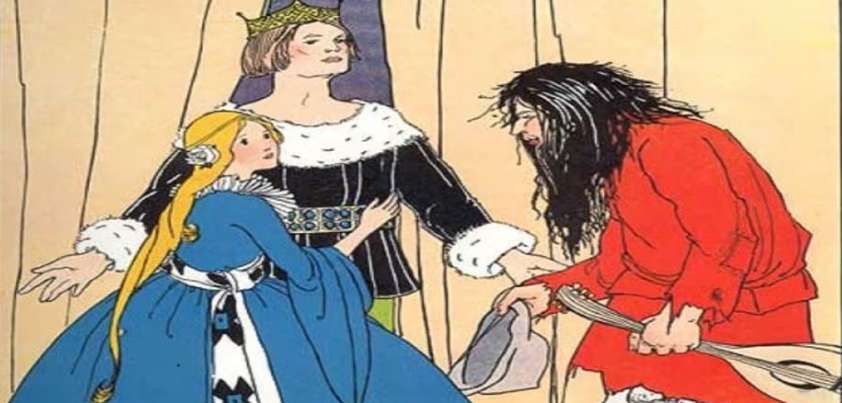 The Brothers Grimm would have us believe that this folktale teaches a valuable lesson by documenting the fall of a spoiled princess who judges potential suitors by looks alone and is so ill-mannered that she says cruel things about them to their faces. Through her punishment (being married to a beggar street musician), we also learn that she has almost no household or practical skills. I’m not sure though about the central idea that the best way to teach humility is to publicly humiliate a person. Isn’t this what the princess was punished for at the beginning of the story? More…
The Brothers Grimm would have us believe that this folktale teaches a valuable lesson by documenting the fall of a spoiled princess who judges potential suitors by looks alone and is so ill-mannered that she says cruel things about them to their faces. Through her punishment (being married to a beggar street musician), we also learn that she has almost no household or practical skills. I’m not sure though about the central idea that the best way to teach humility is to publicly humiliate a person. Isn’t this what the princess was punished for at the beginning of the story? More…
The Frog
 Most ‘frog’ folktales involve a frog prince or at the very least a male frog. However, in this story from Italy, a female frog makes friends with a young man and helps him keep his mother happy as he searches for a wife. Little does the young man know that his perfect woman is sitting on a rock beside him. Three possible morals: 1) Sometimes we don’t appreciate those around us enough; 2) Often the thing we are looking for is right under our noses; 3) Or how about the English idiom beauty is only (frog) skin deep. More…
Most ‘frog’ folktales involve a frog prince or at the very least a male frog. However, in this story from Italy, a female frog makes friends with a young man and helps him keep his mother happy as he searches for a wife. Little does the young man know that his perfect woman is sitting on a rock beside him. Three possible morals: 1) Sometimes we don’t appreciate those around us enough; 2) Often the thing we are looking for is right under our noses; 3) Or how about the English idiom beauty is only (frog) skin deep. More…
The Master Thief
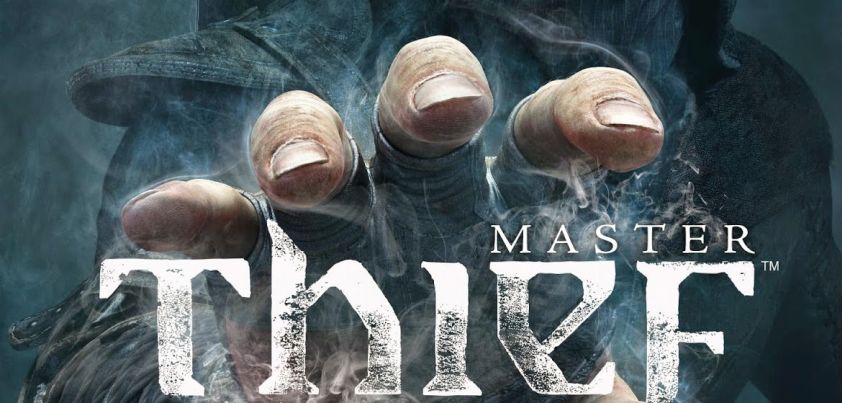 This Norwegian folktale is about a young man whose poor father sends him out into the world to earn a living. He joins a group of robbers, and is so good at stealing that he becomes their leader. The Master Thief returns home a rich man and decides to marry the Governor’s daughter. In order to marry the girl, he must prove how good a thief he is. This story goes against the English idiom: Crime doesn’t pay. The moral seems to be that crime does pay… but only if you are very good at it! More…
This Norwegian folktale is about a young man whose poor father sends him out into the world to earn a living. He joins a group of robbers, and is so good at stealing that he becomes their leader. The Master Thief returns home a rich man and decides to marry the Governor’s daughter. In order to marry the girl, he must prove how good a thief he is. This story goes against the English idiom: Crime doesn’t pay. The moral seems to be that crime does pay… but only if you are very good at it! More…
The Fisherman and His Wife
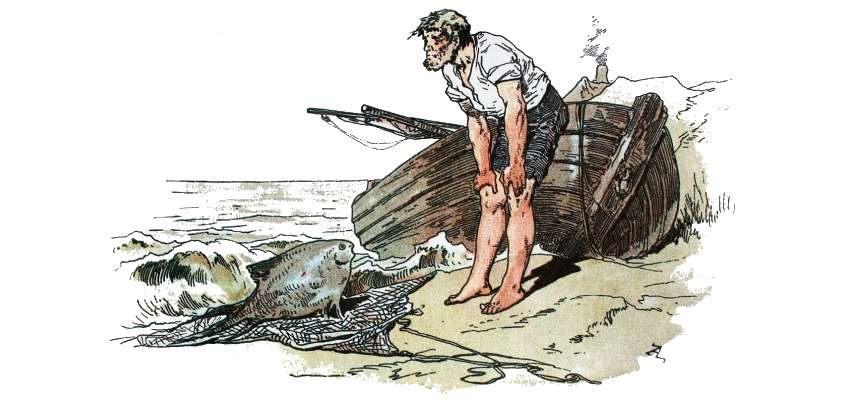 It’s time for another folktale. This one is about dissatisfaction and greed. A poor fisherman catches an enchanted fish and sets it free. When he tells his wife, she is angry that he did not demand a wish in return. She sends him to ask the fish for a nicer house. When the fish grants this, the wife becomes greedy. She sends her husband back several times to ask for bigger and bigger things. Her final wish is so outrageous that the fish either will not or cannot grant it. The fisherman is no doubt happy with what happens next. More…
It’s time for another folktale. This one is about dissatisfaction and greed. A poor fisherman catches an enchanted fish and sets it free. When he tells his wife, she is angry that he did not demand a wish in return. She sends him to ask the fish for a nicer house. When the fish grants this, the wife becomes greedy. She sends her husband back several times to ask for bigger and bigger things. Her final wish is so outrageous that the fish either will not or cannot grant it. The fisherman is no doubt happy with what happens next. More…
The Indian and the Hundred Cows
 In this folktale from the American Southwest, a misunderstanding arises due to a priest’s poor choice of words. In soliciting donations, he alludes to the biblical concept expressed in Mark 10:30, whereby he who gives up everything for God will be rewarded a hundredfold. A misled, or more likely wily, parishioner donates a cow and takes a hundred of the priest’s cattle in return. The story’s message is to make sure you understand the culture of people you are dealing with before making promises and, even then, be careful what you say. More…
In this folktale from the American Southwest, a misunderstanding arises due to a priest’s poor choice of words. In soliciting donations, he alludes to the biblical concept expressed in Mark 10:30, whereby he who gives up everything for God will be rewarded a hundredfold. A misled, or more likely wily, parishioner donates a cow and takes a hundred of the priest’s cattle in return. The story’s message is to make sure you understand the culture of people you are dealing with before making promises and, even then, be careful what you say. More…
Aunty Misery
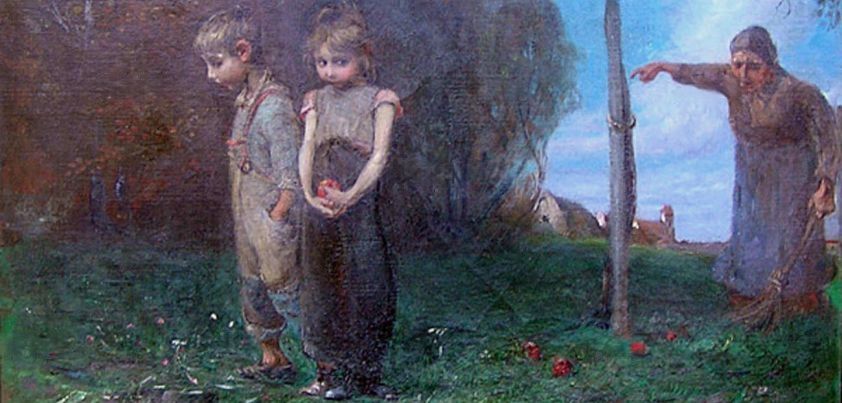 In this Puerto Rican folktale retold by Judith Ortiz Cofer, a lonely old woman has only one love… a beautiful pear tree growing outside her door. Her one hate is mischievous children who climb the tree and steal its fruit. A wish granted by a travelling sorcerer solves her problem with the children and, when Death comes for her, allows her to capture him. Her trick on Death causes so many troubles around the world that she finally releases him in exchange for immortality. The message of the story: there will always be misery and death in the world. More…
In this Puerto Rican folktale retold by Judith Ortiz Cofer, a lonely old woman has only one love… a beautiful pear tree growing outside her door. Her one hate is mischievous children who climb the tree and steal its fruit. A wish granted by a travelling sorcerer solves her problem with the children and, when Death comes for her, allows her to capture him. Her trick on Death causes so many troubles around the world that she finally releases him in exchange for immortality. The message of the story: there will always be misery and death in the world. More…
The Feathered Ogre
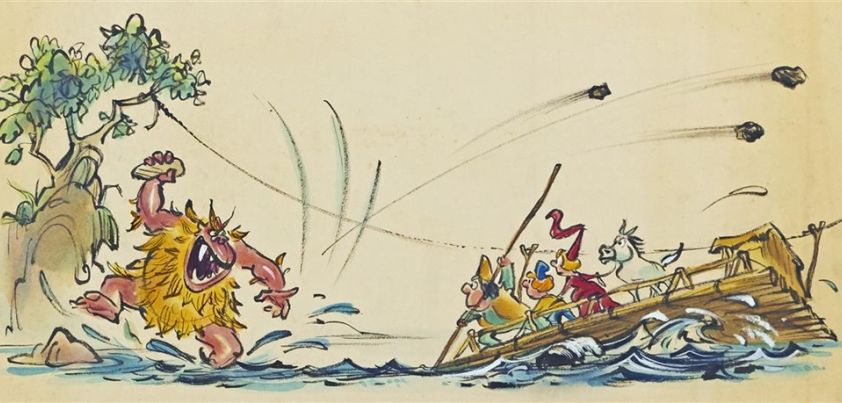 A dying king is told that his only hope for a cure is a magical feather from an ogre known to kill any human it sees. When no one else volunteers to face the creature, one of his most loyal attendants steps forward. The story from here shares elements found in several other European and Eastern folktales: during the journey, he encounters people who request him to ask the ogre for solutions to problems they have been experiencing. Two of the solutions will change his and the ogre’s life. Themes include good vs. evil, loyalty, helping others, courage and bravery. More…
A dying king is told that his only hope for a cure is a magical feather from an ogre known to kill any human it sees. When no one else volunteers to face the creature, one of his most loyal attendants steps forward. The story from here shares elements found in several other European and Eastern folktales: during the journey, he encounters people who request him to ask the ogre for solutions to problems they have been experiencing. Two of the solutions will change his and the ogre’s life. Themes include good vs. evil, loyalty, helping others, courage and bravery. More…